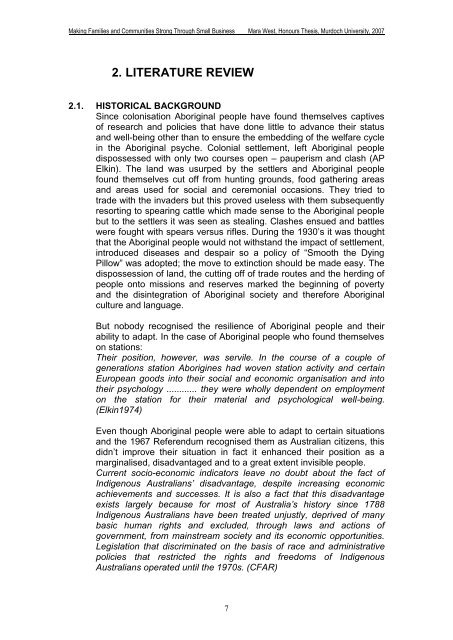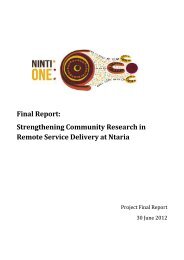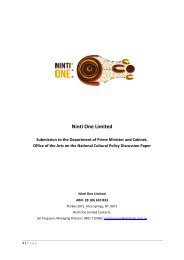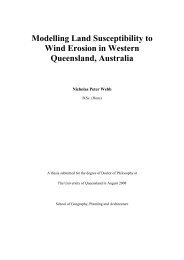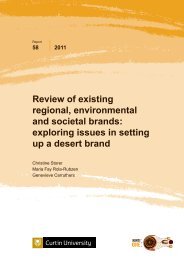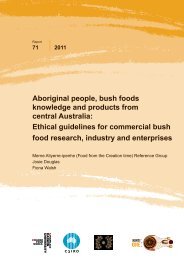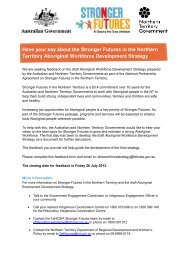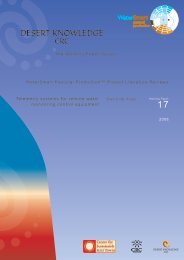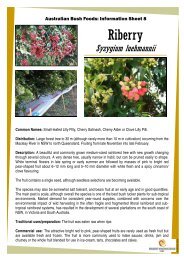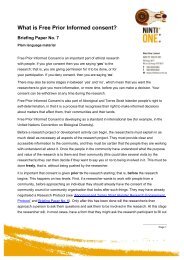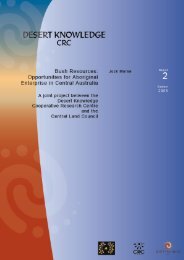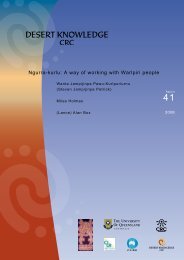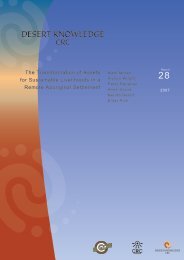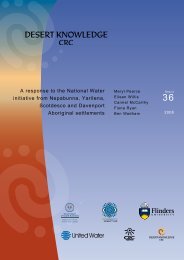MAKING FAMILIES AND COMMUNITIES STRONG THOUGH SMALL BUSINESS
making families and communities strong though small ... - Ninti One
making families and communities strong though small ... - Ninti One
- No tags were found...
You also want an ePaper? Increase the reach of your titles
YUMPU automatically turns print PDFs into web optimized ePapers that Google loves.
Making Families and Communities Strong Through Small Business Mara West, Honours Thesis, Murdoch University, 20072. LITERATURE REVIEW2.1. HISTORICAL BACKGROUNDSince colonisation Aboriginal people have found themselves captivesof research and policies that have done little to advance their statusand well-being other than to ensure the embedding of the welfare cyclein the Aboriginal psyche. Colonial settlement, left Aboriginal peopledispossessed with only two courses open – pauperism and clash (APElkin). The land was usurped by the settlers and Aboriginal peoplefound themselves cut off from hunting grounds, food gathering areasand areas used for social and ceremonial occasions. They tried totrade with the invaders but this proved useless with them subsequentlyresorting to spearing cattle which made sense to the Aboriginal peoplebut to the settlers it was seen as stealing. Clashes ensued and battleswere fought with spears versus rifles. During the 1930’s it was thoughtthat the Aboriginal people would not withstand the impact of settlement,introduced diseases and despair so a policy of “Smooth the DyingPillow” was adopted; the move to extinction should be made easy. Thedispossession of land, the cutting off of trade routes and the herding ofpeople onto missions and reserves marked the beginning of povertyand the disintegration of Aboriginal society and therefore Aboriginalculture and language.But nobody recognised the resilience of Aboriginal people and theirability to adapt. In the case of Aboriginal people who found themselveson stations:Their position, however, was servile. In the course of a couple ofgenerations station Aborigines had woven station activity and certainEuropean goods into their social and economic organisation and intotheir psychology ............ they were wholly dependent on employmenton the station for their material and psychological well-being.(Elkin1974)Even though Aboriginal people were able to adapt to certain situationsand the 1967 Referendum recognised them as Australian citizens, thisdidn’t improve their situation in fact it enhanced their position as amarginalised, disadvantaged and to a great extent invisible people.Current socio-economic indicators leave no doubt about the fact ofIndigenous Australians’ disadvantage, despite increasing economicachievements and successes. It is also a fact that this disadvantageexists largely because for most of Australia’s history since 1788Indigenous Australians have been treated unjustly, deprived of manybasic human rights and excluded, through laws and actions ofgovernment, from mainstream society and its economic opportunities.Legislation that discriminated on the basis of race and administrativepolicies that restricted the rights and freedoms of IndigenousAustralians operated until the 1970s. (CFAR)7


